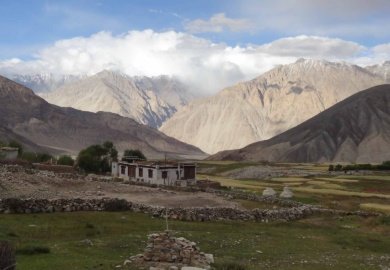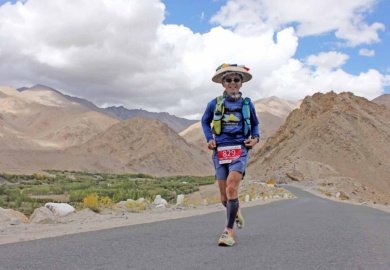You don’t so much arrive in Old Delhi as you are absorbed by it
The city narrows here into arteries and capillaries of stone and sweat, churning people through history with neither sentiment nor apology. The moment I stepped out of the metro station at Chandni Chowk, the air was already different – thicker, slower, smeared with engine fumes and sandalwood, goat tallow, and boiling milk. Somewhere in the distance, a train groaned. Closer, the jangle of rickshaw bells, sharp honks, and the steady hum of barter filled in the gaps. But none of that mattered. I was following my nose, and it led me to Khari Baoli, Asia’s oldest living spice market.
The sun was barely up, yet the place was awake in a way that had nothing to do with time. It was active, like a nervous system. The rhythm of the day was set not by clocks but by weight- the heft of burlap sacks being hoisted onto sweating backs, the clink of steel scales measuring out grams of powdered fire, the shuffle of men with orders to fill, prices to shout, deals to cut before the light got too harsh and the scent of cumin became too dizzying.
I stopped first for chai. It seemed the only way to begin, and Delhi did not make this choice hard. The tea stall was as forgettable as any: dented pots, rusted counter, one cracked glass balanced atop another. But the tea was everything – thick, perfumed, overboiled into brilliance. I drank it standing up, elbow-to-elbow, with a man who smelled of turmeric and had the kind of fingers that had wrapped spice bundles since before I was born. I said nothing. Neither did he. In Old Delhi, the tea speaks for you.
I turned toward the entrance of the spice market proper – not that there was a real entrance. Khari Baoli has no gates. You simply drift into it, and it folds you into its grainy, fragrant world. The alley darkened quickly. Sunlight became something rare, filtered through awnings and plastic tarps. Shadows fell in strange geometries. And then it hit me. The smell
It isn’t easy to write about a scent that contains all other scents. The aroma of Khari Baoli is not one thing – it is everything. Red chilies dry-roasting on a jute mat, their sting making my nostrils flare involuntarily. Mounds of coriander crushed to powder by some invisible mortar. Cloves, raw and sharp. Nutmeg, musky and secretive. There was cumin. There was fenugreek. There was something floral, possibly rose petals or marigold, and beneath it all – a warm earthiness, like the breath of a deep, sleeping animal. This wasn’t just smell. It was memory, heritage, and geography, all combusting in the same thin slice of air.
Vendors shouted in Hindi, Urdu, sometimes Punjabi, and occasionally English. But the words weren’t meant to be understood – they were meant to keep the air alive, to prove presence. I was jostled, pinched, pressed, guided, and ignored all at once. At one point, a boy no older than ten shoved a scoop of dried mango into my hand. I bit into it before realizing I’d broken the cardinal rule of Delhi street wisdom: never eat first, ask later. But it was good – sticky, sweet, spiced with masala. My mouth burned and watered. The boy grinned like a man who’d just won a bet.
The stalls were more like shrines than shops. Great pyramids of yellow turmeric, each grain sunlit from within. Bundles of cinnamon bark tied like sacred scrolls. Mountains of green cardamom, their pods glowing like forest fruit. Behind them sat men – mostly older, bearded, gold-rimmed glasses perched low on their noses – surveying the market like emperors of scent. No one rushed. Yet no one was idle. This was the choreography of commerce performed without music, in a space where even the chaos has rules.
A man waved me into his stall with a practiced flick of his hand. He introduced himself as Imtiaz, a fourth-generation merchant of black pepper. Only black pepper. He sold ten varieties of it – Malabar, Tellicherry, Vietnamese, organic, smoked, crushed, and a kind I had never heard of that he called “elephant grade.” I asked what made it special. He smiled, said, “Elephant also sneezes,” and handed me a sample. I sniffed. My eyes watered instantly. It felt like truth.
We spoke of trade routes and moisture percentages. He showed me an old invoice from 1952, written in Urdu on yellowed paper and signed in a fountain pen. “My grandfather’s first export,” he said. “To London.” He folded it with reverence as though it might tear history itself. I bought nothing. He didn’t mind.
Further down the alley, a woman stood behind a stall stacked with dried rose petals and sandalwood curls. Her dupatta was faded but clean; her bangles made no sound when she moved. She saw me hesitate. “This is the ladies’ corner,” she said proudly. “For rituals and weddings. We prepare blessings.” I asked if I could take a photo. She nodded but did not smile. The shutter clicked. She resumed sorting jasmine buds into copper bowls.
The market is not linear. It doubles back on itself, loops around, disappears into courtyards, and climbs stairs you didn’t see coming. Eventually, I found myself on a second-floor landing that felt more like an attic – dusty light, faded posters, a sleeping dog curled beside a heap of dried ginger. The air here was lighter, the scent distilled. I could see the rooftops of Old Delhi – silver tanks, jumbled antennas, fraying prayer flags. Pigeons swirled like ash in a breeze that carried distance again. And below, the spice market pulsed on -timeless, unsentimental, utterly alive.
From this vantage point, the whole of Khari Baoli revealed its skeleton: the patterns of labor, the slow turn of commerce, the dense intimacy of an ecosystem that had no beginning and, seemingly, no end. Men moved in rhythm with weight and purpose. Carts rolled in diagonals. Women haggled with an authority that brokers in New York might envy. Above it all, the aroma lingered – less aggressive now, more ritualistic. Like incense. Or memory.
Downstairs again, I paused to watch a porter rest. He sat on a crate of sesame seeds, sipping water from a steel tumbler, sweat pooling on his collarbone. I asked how long he’d been working. “Since I was small,” he said. “Like that one.” He nodded toward a boy, balancing a packet of cumin on his head. “This place… it is not job. It is breath.”
I bought a few things on impulse. A small packet of saffron I couldn’t afford. A jar of fennel candy. A brass grinder shaped like a lion’s head that I knew would be too heavy to carry but couldn’t resist. Later, I would lose the grinder at airport security, and the candy would melt in my bag. But at that moment, the purchases felt like part of a transaction, not of goods, but of intimacy with a place.
There’s a kind of fatigue that sets in after three hours in Khari Baoli. Not the weariness of distance but of overstimulation. Your senses reach a limit. You no longer smell spice; you smell exhaustion. Colors blur. Sounds flatten. Every surface is coated in fine dust, and your tongue feels foreign in your mouth. That’s when I knew it was time to leave.
But Old Delhi does not let go easily. On my way out, I was stopped by an older man sitting cross-legged on a wooden platform, surrounded by sacks of star anise and licorice root. He didn’t sell to tourists. He didn’t even look up when I paused. He just murmured, “Acha khushbu hai, na?”- Nice fragrance, no? I nodded. He smiled faintly. “It’s the smell of home.”
Outside the spice market, the chaos of Delhi resumed its regular programming- honks, dogs, street children selling balloons, men hawking knock-off headphones, and the endless hum of generators. But everything felt different. The world beyond Khari Baoli was suddenly too quiet, too colorless. It lacked weight.
I made my way to a small canteen not far from the Red Fort and ordered another chai. The tea here was thinner, the cardamom less sure of itself. But I drank it slowly, swirling the day in my memory like sugar that wouldn’t dissolve. The morning had clung to me – on my hands, in my clothes, in the inside corners of my eyes.
Delhi is not a place you see. It’s a place you survive and then remember. And Khari Baoli, with its cascading chaos and fragrant violence, is not a market. It is a ceremony. A temple of trade. A living archive of spice and sweat and stubborn, sacred continuity.
And as I sat there, fingering rose petals in my pocket that had turned to dust, I realized I had not walked through Khari Baoli. It had walked through me.




